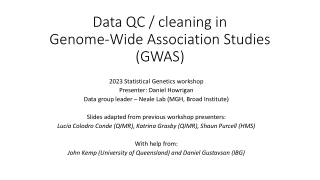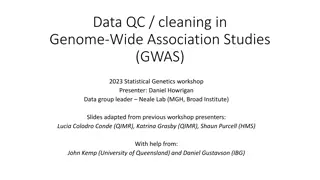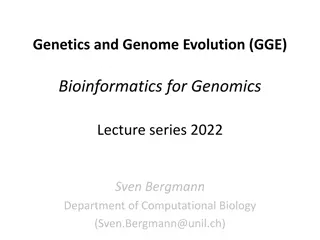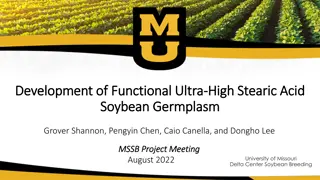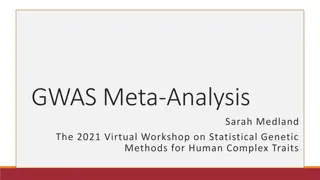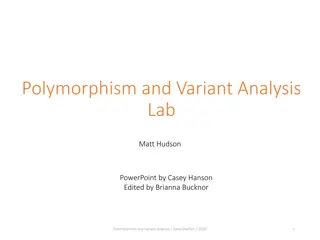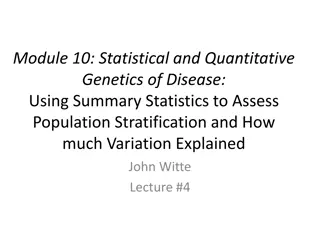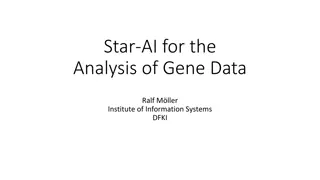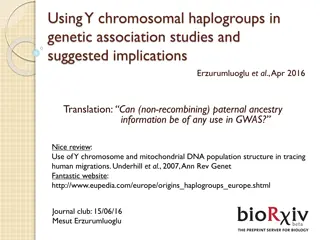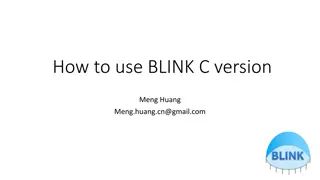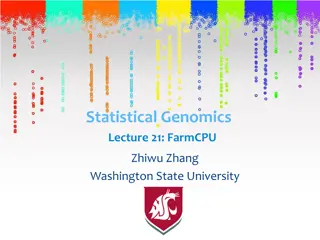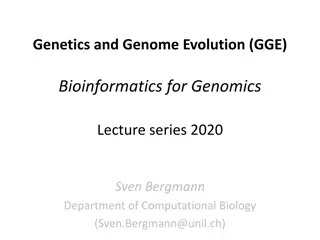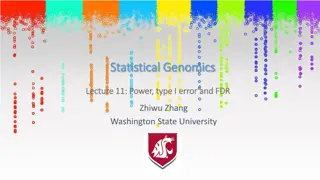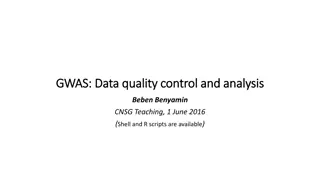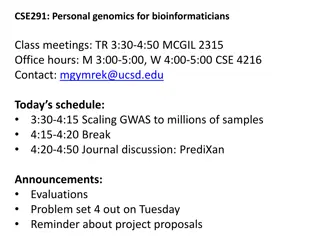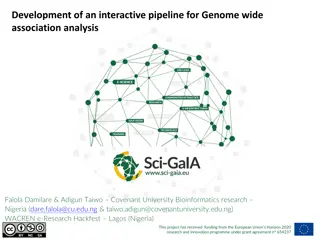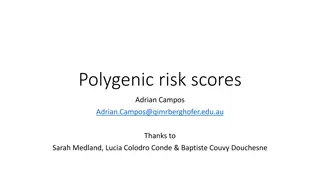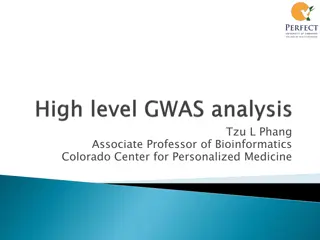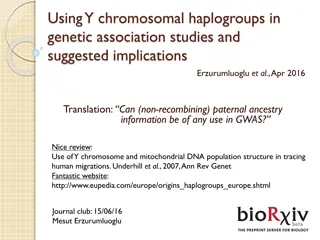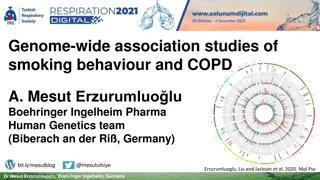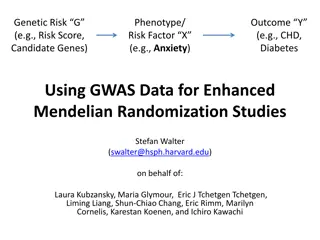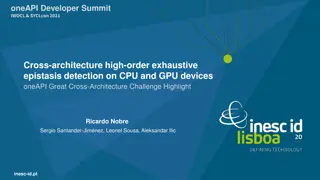Data QC / cleaning in Genome-Wide Association Studies (GWAS)
Daniel Howrigan, Data group leader at Neale Lab (MGH, Broad Institute), for a workshop on data QC and cleaning in GWAS. Learn about goals of GWAS, genetic data visualization, QC methods, and more.
4 views • 35 slides
Genome-Wide Association Studies in Statistical Genetics Workshop
Explore the essentials of Genome-Wide Association Studies (GWAS) and genetic data quality control as presented by Daniel Howrigan in the 2023 workshop. Delve into the goals of GWAS, genetic data characteristics, SNP variations, and genotyping techniques. Gain insights into moving from trait heritabi
4 views • 35 slides
Bioinformatics for Genomics Lecture Series 2022 Overview
Delve into the Genetics and Genome Evolution (GGE) Bioinformatics for Genomics Lecture Series 2022 presented by Sven Bergmann. Explore topics like RNA-seq, differential expression analysis, clustering, gene expression data analysis, epigenetic data analysis, integrative analysis, CHIP-seq, HiC data,
4 views • 36 slides
Innovative Development in High Stearic Acid Soybean Germplasm Breeding at University of Missouri Delta Center
Innovative research on developing high stearic acid soybean germplasm is being conducted at the University of Missouri Delta Center. Challenges in breeding high stearic soybeans, such as sodium azide-induced deletions and mutant alleles in SACPDs, are being addressed. Promising lines identified from
1 views • 9 slides
Meta-Analysis in GWAS: Methods and Applications
Meta-analysis in GWAS involves combining data across studies to estimate overall effects, explore cohort differences, improve power, and replicate findings. It includes joint vs. meta-analysis, methods, and types such as fixed effect and random effect meta-analyses.
17 views • 20 slides
Polymorphism and Variant Analysis Lab Exercise Overview
This document outlines a lab exercise on polymorphism and variant analysis, covering tasks such as running Quality Control analysis, Genome Wide Association Test (GWAS), and variant calling. Participants will gain familiarity with PLINK toolkit and explore genotype data of two ethnic groups. Instruc
3 views • 43 slides
Statistical and Quantitative Genetics of Disease: Understanding Population Stratification
This lecture explores the use of summary statistics to assess population stratification and the impact of LD on association studies in statistical and quantitative genetics. It delves into LD scores, genomic inflation, polygenic inheritance, and separating SNP heritability from population stratifica
7 views • 29 slides
Star-AI for Genetic Data Analysis: Incorporating Knowledge in Statistical Modeling
Knowledge-based approaches are crucial in genetic data analysis to enhance the accuracy and scope of genome-wide association studies (GWAS). Stochastic Relational AI (Star-AI) offers a solution by leveraging probability theory and First Order Logic to capture complex genetic interactions. By integra
2 views • 10 slides
Genomic Imputation Pipeline Overview
This document outlines a genomic imputation pipeline for multiple GWAS studies using reference panels such as 1000 Genomes Phase I data. It covers steps like data matching, phasing, and imputation using tools like Beagle and Minimac. The expected output includes imputed dosages and quality measures.
2 views • 6 slides
Y Chromosomal Haplogroups in Genetic Studies
Exploring the utility of non-recombining paternal ancestry information in Genome-Wide Association Studies (GWAS) through the analysis of Y chromosomal haplogroups. This review delves into the implications of using Y chromosome and mitochondrial DNA data in tracing human migrations, ancestry, bottlen
2 views • 27 slides
Guide on Using BLINK C Version for Genetic Analysis
This guide provides step-by-step instructions on how to effectively use the BLINK C version for genetic analysis. It covers tasks such as preparing input files, handling phenotype and covariates data, implementing GWAS using BLINK, transforming genotype data, compressing to BLINK binary format, conv
4 views • 9 slides
Advancements in Statistical Genomics: FarmCPU and Method Development
Exploring the evolution of statistical genomics techniques, this lecture delves into the history of FarmCPU and BLINK, addressing challenges in GWAS and the development of models like PC+SNP+e and PC+Kinship+e. It also covers popular software packages in the field and the importance of moving beyond
3 views • 24 slides
Genomics and Bioinformatics in Genetics Evolution
Delve into the world of genomics and bioinformatics through the Genetics and Genome Evolution (GGE) lecture series by Sven Bergmann. Explore topics such as RNA-seq analysis, differential expression, gene expression measurement techniques, and integrative analysis with epigenetic data. Gain insights
7 views • 37 slides
Power, Type I Error, and FDR in Statistical Genomics
Explore concepts of statistical genomics in Lecture 11 focusing on power, type I error, and false discovery rate (FDR) in GWAS analysis. The content covers simulations of phenotype from genotype data, GWAS by correlation, resolution and bin approach, and implications on QTN bins for power and error
2 views • 21 slides
GWAS: A Brief Overview of Genetic Association Studies
GWAS, or Genome-Wide Association Studies, are a method used to map genes associated with traits or diseases by analyzing genetic markers throughout the genome. This process involves statistically testing the association between SNPs and traits using regression or chi-squared tests in a hypothesis-fr
4 views • 19 slides
Challenges and Solutions in Scaling GWAS for Bioinformaticians
Exploring the challenges of scaling Genome Wide Association Studies (GWAS) to millions of samples, covering topics like FastPCA, TeraStructure, and imputation with Eagle. The session delves into working with summary statistics, exemplified by PrediXan journal discussion, and outlines concepts and ex
6 views • 46 slides
Development of an interactive pipeline for Genome wide
This project focuses on developing an e-infrastructure for accurate Genome Wide Association Study (GWAS) analysis, enabling researchers to efficiently study genetic variations and their associations with diseases. By providing a user-friendly interface and powerful visualization tools, this tool aim
1 views • 14 slides
Polygenic risk scores
Polygenic risk scores (PRS) utilize multiple genetic variants to estimate overall trait scores, improving prediction accuracy for complex traits. This presentation discusses GWAS, allele effect sizes, variant selection, LD considerations, and diverse PRS applications.
2 views • 40 slides
Genome-Wide Association Studies: Uncovering Disease Genetics
A genome-wide association study (GWAS) is an approach involving scanning markers across the genome to identify variations associated with a specific disease. Large subject numbers are required due to the low odds ratios expected between SNPs and causal variants. Such studies are valuable for discove
1 views • 15 slides
Genetic Associations Using Y-Chromosomal Haplogroups
Using Y-chromosomal haplogroups in genetic association studies can provide insights into ancestral origins, migrations, and disease susceptibility. This approach involves stratifying individuals based on their Y-DNA haplogroups to assess differential phenotypic effects. Explore the implications and
0 views • 27 slides
Genome-wide association studies of smoking behaviour and COPD
Genome-wide association studies explore the relationship between genetic variants and smoking behavior in COPD. Dr. Mesut Erzurumluoğlu and the Boehringer Ingelheim Pharma Human Genetics team in Germany discuss the genetic basis of smoking, single nucleotide polymorphisms (SNPs), alleles, and their
3 views • 12 slides
Challenges in GWAS: Data Quality Control and SNP QC
GWAS face challenges such as data quality control issues, small sample sizes, computational burden, and inadequate SNP coverage. SNP QC for GWAS involves identifying problems like Hardy-Weinberg equilibrium, missing genotypes, and frequency differences. Intensities must be converted to genotypes, an
3 views • 26 slides
Genomic Data Privacy and Utility Analysis
Balance between privacy and utility in publicly released SNP data for GWAS, focusing on re-identification risks and identification of significant SNPs. The study involves datasets from the Personal Genome Project and HapMap Project, with emphasis on privacy protection techniques and association test
1 views • 22 slides
Type 2 Diabetes and Genetic Research
Type 2 diabetes is a condition where the body resists insulin or doesn't produce enough. Explore the genetic research on SNPs and GWAS related to diabetes, including findings from multi-ethnic populations.
0 views • 27 slides
Meta-Analysis in GWAS: Methods and Applications
Explore the world of Meta-Analysis in Genome-Wide Association Studies (GWAS) through topics like combining data across studies, joint vs. meta-analysis, and types of meta-analysis. Dive deep into fixed and random effect models, how meta-analysis is used in GWAS, and its significance in estimating ov
4 views • 23 slides
Enhanced Mendelian Randomization Studies Using Genetic Risk Scores
Explore the application of genetic risk scores in enhanced Mendelian randomization studies to investigate the relationships between genetic risk, phenotypes such as anxiety and depression, and outcomes like CHD and diabetes using GWAS data. The study delves into projects focusing on anxiety, depress
1 views • 10 slides
Privacy and Utility Balance in Genomics Research
Explore the challenges and goals of balancing privacy and utility in genomic data sharing for GWAS. Analyze re-identification risks and significant SNP identification across case and control populations. Tasked with understanding the impact of proper anonymization on publicly released SNP data, this
0 views • 22 slides
Multivariate GWAS in Genomic SEM: Steps and Example
Explore the process of Multivariate Genome-Wide Association Studies (GWAS) within Genomic Structural Equation Modeling (SEM). Learn the four primary steps involved, including munging summary statistics, running LD-Score Regression, preparing for multivariate GWAS, and conducting the analysis. Discov
2 views • 20 slides
Cross-Architecture High-Order Epistasis Detection on CPU and GPU Devices
Uncover the genetic basis of complex diseases through Genome-wide association studies (GWAS) and Single Nucleotide Polymorphism (SNP) analysis. Explore how epistasis helps explain certain traits and discover CUDA-based high-order epistasis detection methods. Learn about cutting-edge research in unde
1 views • 13 slides
Partitioning Genetic Effects: Maternal and Fetal Components
Using Structural Equation Modeling (SEM) to partition genetic effects of individual SNPs into maternal and fetal components, this content explores applications in statistical genetics/genomics. Topics covered include birthweight GWAS, model building, and disentangling mother and child effects. Traci
2 views • 20 slides
Using SEM for Genetic Effects Partitioning
How Structural Equation Modeling (SEM) can partition genetic effects of individual SNPs into maternal and fetal components. See real-world applications in birthweight GWAS studies and learn about disentangling mother and child effects through SEM. Discover the intricacies of conditional analysis, mo
2 views • 30 slides
Introduction to GWAS: Understanding Genetic Association Studies
Explore the world of Genome-Wide Association Studies (GWAS) in this informative introduction covering hypothesis-free genetic variation analysis, quantitative trait regression, case-control logistic regression, relatedness considerations, and their importance in understanding genetic associations wi
4 views • 6 slides
Privacy-Preserving Data Exploration in Genome Studies
Discover the genetic basis for diseases through genome-wide association studies while addressing privacy risks. Learn about SNP analysis, case-control GWAS, finding disease-correlated SNPs, patient privacy concerns, and the concept of differential privacy.
2 views • 14 slides
ChIP-Seq Data Analysis: GWAS SNP Enrichment and Peak Association Insights
Explore the ChIP-Seq analysis pipeline, GWAS SNP enrichment, and the association between ChIP-Seq peaks and GWAS SNPs in different diseases. Discover the significance of H3K27ac peaks, disorder SNPs, and more in this comprehensive study.
0 views • 8 slides
Exploring OS and R: Workshops, Linux, and Server Tips
Dive into the world of operating systems and R programming with Sarah Medland, where workshops offer valuable insights and hands-on experiences. Learn about Debian OS, Linux, file hygiene, and server best practices. Discover the importance of collaboration, diverse skill sets, and making the most of
0 views • 39 slides
Understanding Challenges in Mendelian Randomization Studies
Mendelian Randomization (MR) studies face challenges due to the use of numerous genetic variants from GWAS, increasing power but raising the risk of pleiotropy. Pleiotropic variants can bias causal estimates and lead to false positives, impacting the validity of results.
2 views • 35 slides
Comprehensive Guide to Plotting in R for Bioinformatics Team
Learn how to plot data in R with this comprehensive guide tailored for the Bioinformatics team. Topics covered include basic plot functions, heatmap generation, GWAS plots, interactive plotting, and more. Follow along with hands-on examples and tips from experts in the field.
1 views • 47 slides
GWAS Tutorial Insights
Discover key insights from the GWAS tutorial presented by Shubhabrata Joey Mukherjee, PhD, Laura E. Gibbons, PhD, and Elizabeth Sanders. Gain knowledge about genotyped data, SNP selection, and phenotypes such as ADNI-Mem, ADNI-Exec, and WMH. Explore beyond the tutorial for additional resources on Bo
0 views • 14 slides
